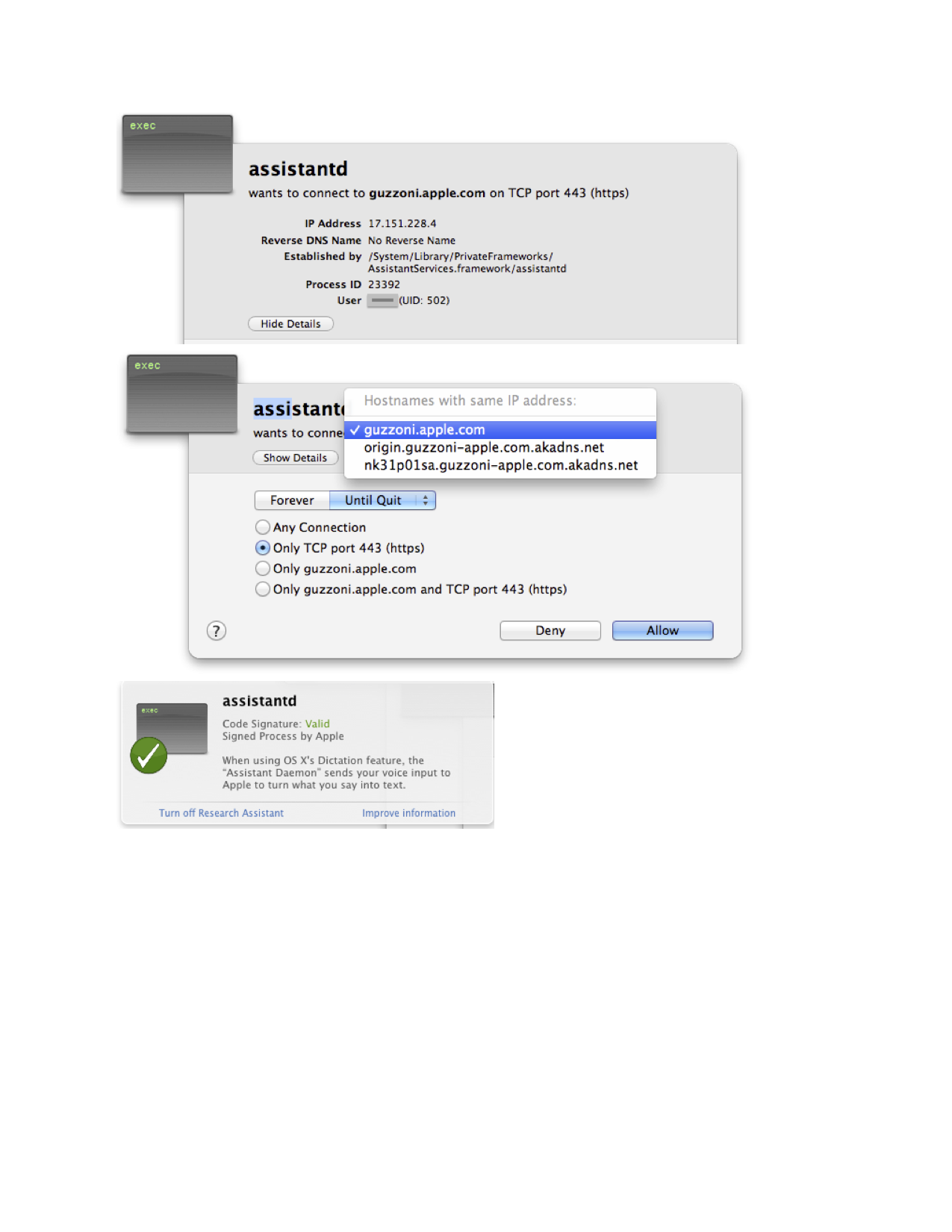I don't think it's possible to use Dictation without sending ALL spoken data to Apple.
The process assistantd is launched.
I own both Little Snitch and HandsOff!. These images are all that little snitch offered with the popup after I went in and disabled its default and protected rule which is referenced in the block-quote below the image. Protocol 6 I believe is HTTPS, so http with SSL.
If the connection to guzzoni.apple.com is not completed in some fraction of a second (tested with 3 controls this), then the little dictation bubble / microphone icon just goes into the 'close' mode. I might try following activity with Fseventer later too, but I'm out of time at the moment. Also, I captured activity sent but it was just a bunch of garble, probably b/c it was already encrypted at that point.
Another workaround that I may try:
install a Mountain Lion virtual Machine, and use dictation there. I'll report back on my findings, especially if I have a good experience with emulation (VMWare is my preferred program).
+1 to the other workaround too!

From the default rule that I temporarily disabled to bring up the pop-up.
action: allow
direction: outgoing
process:
/System/Library/PrivateFrameworks/AssistantServices.framework/assistantd
destination: domain apple.com
port: 443
protocol: 6
help:
This rule is necessary if you want to use Apple’s dictation services.
IP Addresses: 17.149.32.8-17.149.32.11, 17.149.32.13,
17.149.32.15-17.149.32.79, 17.149.34.57, 17.149.34.59, 17.149.34.61-17.149.34.63, 17.149.36.71-17.149.36.129, 17.149.36.131-17.149.36.184, 17.149.36.186-17.149.36.189, 17.149.36.191-17.149.36.194, 17.149.36.196-17.149.36.199, 17.149.36.201-17.149.36.204, 17.149.36.206-17.149.36.209, 17.149.36.211-17.149.36.214, 17.149.36.216-17.149.36.218, 17.149.36.221-17.149.36.223, 17.149.36.225-17.149.36.227, 17.149.37.18-17.149.37.20, 17.149.156.20, 17.149.160.33, 17.149.160.49, 17.151.2.13, 17.151.28.5-17.151.28.6, 17.151.62.20, 17.151.228.4, 17.152.19.127, 17.152.19.253, 17.152.249.54, 17.154.66.17-17.154.66.18, 17.154.66.75, 17.172.224.14, 17.172.224.47, 17.172.232.51-17.172.232.97, 17.172.232.99-17.172.232.120, 17.172.232.124-17.172.232.149, 17.172.232.151-17.172.232.221, 17.172.233.88-17.172.233.139, 17.172.233.159, 17.172.238.202-17.172.238.205, 17.172.238.207, 17.254.0.51, 17.254.2.64, 17.254.2.129, 17.254.21.57, 23.56.125.15, 63.140.56.117, 63.140.60.14, 66.235.132.118, 66.235.132.121, 66.235.132.152, 66.235.132.232, 66.235.133.11, 66.235.133.14, 66.235.133.33, 66.235.133.62, 66.235.138.2, 66.235.138.18-66.235.138.19, 66.235.138.44, 66.235.138.59, 66.235.139.110, 66.235.139.118, 66.235.139.121, 66.235.139.152-66.235.139.153, 66.235.139.166, 66.235.139.180, 173.228.66.8-173.228.66.10, 184.28.156.224, 184.85.50.217, 184.85.51.36, 184.85.56.143, 184.85.58.64, 184.85.59.171, 184.85.60.244-184.85.60.245, 184.85.61.15, 184.85.61.88, 184.85.225.54

